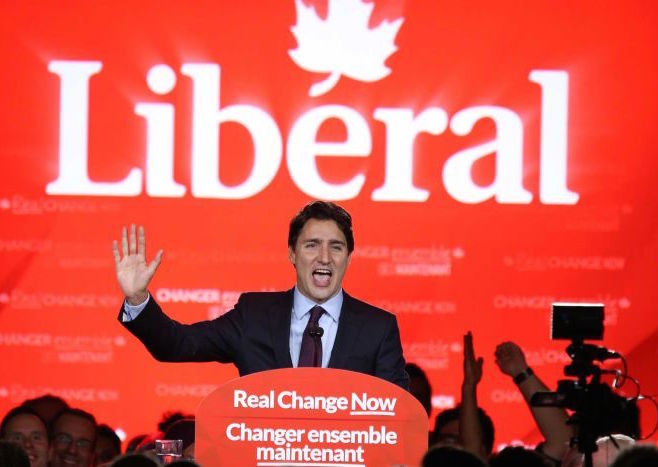Canada’s Hollow Victory
Despite the defeat of Harperism in yesterday's Canadian election, the Liberals' victory leaves little to celebrate.

Justin Trudeau, Canada's newly elected prime minister, celebrates his victory in yesterday's election. Share GK / Flickr
Plenty of Canadians are celebrating that Stephen Harper’s autocratic and malicious rule has finally come to an end, and their sentiments are perfectly understandable.
But I hope those enthusiastic about the words “Prime Minister Justin Trudeau” will try to understand why some of us don’t feel like celebrating today, and why the defeat of the Harper Conservatives by the son of former Prime Minister Pierre Trudeau rings hollow.
The Liberal campaign embraced a sprightly lexicon of positivity, unity, and tolerance in contrast to a Conservative campaign built on fear and race-baiting. But their parliamentary caucus voted for Harper’s absurd “Zero Tolerance for Barbaric Cultural Practices Act” only a few short months ago. And they supported (and will not repeal) Bill C-51, which risks criminalizing people who protest oil pipelines and threatens artistic expression.
It’s quite possible that the minister of justice in Trudeau’s cabinet will be a former police chief who defends the racist practice of carding and presided over the largest set of peacetime arrests in Canadian history. The co-chair of Trudeau’s campaign was recently outed as a lobbyist who, before the campaign had even finished, was already trying to help his friends at TransCanada Corp get a pipeline built.
Behind the selfies and the carefully staged theatrics, behind the vague but flourishing invocations of “hope” and “change,” behind the crowds of grinning patricians, behind the formless nostalgia for ’60s Trudeaumania, many of us see a politics as calculating and ultimately uninterested in social justice as that which today’s liberalism sets itself against.
In many parts of the country last night, environmentalists, trade unionists, and progressives were unseated in favor of corporate technocrats. The business of hyper-professionalized politics — momentarily disrupted by a new political dynamic — will now reassert itself with a vengeance.
The new government is going to temporarily invest billions in new (though largely unspecified) infrastructure, after which it will make billions in (also unspecified) cuts. It will not create any new social programs, and has instead promised to adopt a means-tested approach to social policy that simply helps some low-income earners better navigate unjust market structures with bigger checks than they were getting before.
It will not set targets to reduce greenhouse gas emissions (because, in Trudeau’s words, “what we need is not ambitious political numbers”). It will almost certainly finalize a trade deal that will decimate what remains of manufacturing in Canada’s largest province, undermine Canadians’ privacy online, make life-saving drugs unaffordable by creating a global cartel for pharmaceutical giants, and erode the country’s democratic sovereignty by enabling multinationals to sue elected governments over laws and regulations they dislike.
Throughout its entire democratic history, Canadian politics has oscillated between two parties that do not seriously challenge the status quo or the injustices it permits. Occasionally goaded by popular movements, they have both been compelled, particularly during minority parliaments, to make concessions while preserving the fundamental contours of the political order.
Against this a third current, born from Methodist social gospel and the labor mobilizations of the nineteenth century, has always insisted that fundamental change is necessary to build a truly just society. It was this ethos that gave us Medicare — an institution built from the ashes of war and depression on principles of universalism and social solidarity. Neither sweeping platitudes nor bureaucratic conservatism will ever deliver us social progress of this kind, eradicate poverty, or save the environment from the extractive economic structures that degrade it every day.
Despite the palpable optimism throughout much of the country today, many of us cannot read a return to the historic two-party dynamic as anything other than a setback, and a major one.
It’s time we stopped marginalizing social justice, or patronizingly relegating it to the fringes. Achieving social progress requires more than just a perpetual return to the traditional, professionalized politics that continues to leave one in seven Canadians in poverty, tolerates people having to sleep on the streets, and allows thousands of children to wake up hungry and badly housed every single day in one of the richest societies in the world.
We have to demand better, and stop settling for less. The Left’s task is to organize to turn that hope into a reality.